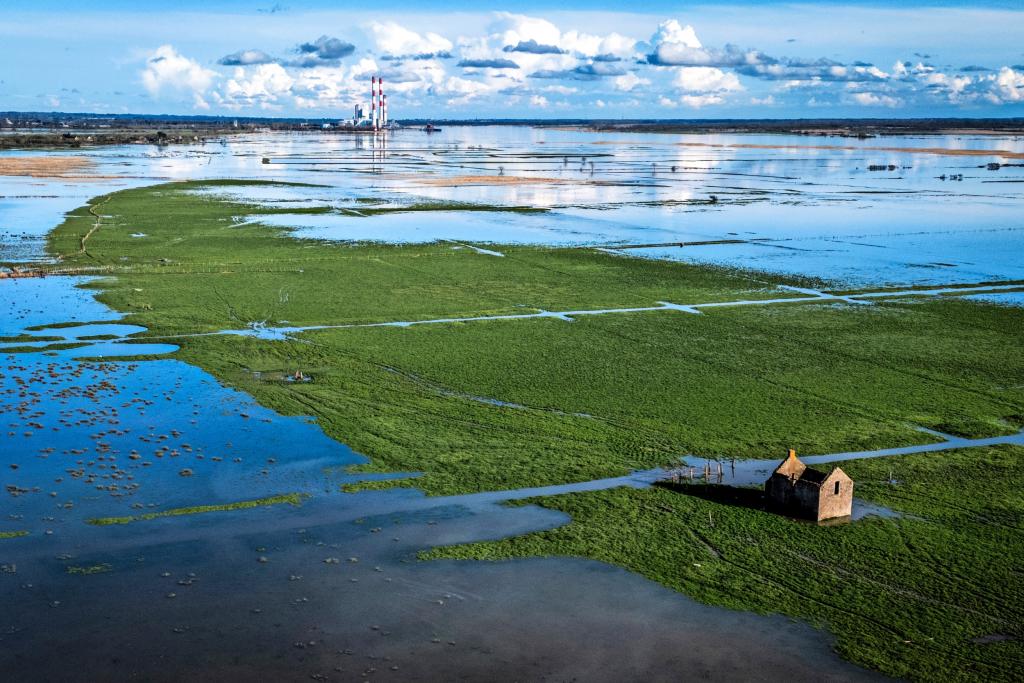High food prices and the worst financial crisis in human history: the consequences of global warming will be dire.
Global warming and its catastrophic consequences are no longer prominent in the news. Newsmakers have other priorities, such as wars and immigrants.
News consumers are happy because they are no longer faced with the reality that they are contributing to a global problem that they must help solve by changing their behavior. Pretending that nothing is wrong is the easy solution.
But the scientific world remains cautious. She studies the numbers and sees how global warming is accelerating and its consequences. She continues to warn, like crying in the desert. The tone of publications documenting the consequences of lax climate policies has become increasingly sensational.
Future generations of people will suffer a serious loss of comfort if we fail to change course in time. As we go now, things are not looking good.
chocolate
In the trade magazine Earth and Environment Communications A clear and scientifically proven message emerged that food prices will rise sharply as a result of global warming.
According to the study, conducted in collaboration with the European Central Bank, which is not an activist environmental organisation, food prices around the world will rise by 0.9 to 3.2 percent annually by 2035, pushing inflation up by about 1 percent annually.
Consumers will be able to buy smaller quantities for the same money. The authors found that many economists considered their conclusions “shocking.” They did not expect such a big impact.
Food prices rise: 'Cheap abundance is coming to an end'
The reason behind the rise in prices is clear: global warming is leading to more extreme weather conditions, which causes food production to falter. Long droughts, heavy floods and rampant epidemics took their toll.
The examples are there for the taking. The price of chocolate rose unprecedentedly due to problems in cocoa production. In our country, it was not possible to harvest large quantities of potatoes and other crops last season because the fields were flooded.
Inflation is 4 percent
The researchers found a strong direct relationship between temperature and other weather data from 121 countries and subsequent food prices. It turns out that heat in particular is a more disastrous factor than rain.
Technologies to remove carbon dioxide from the atmosphere will only be useful if we succeed in significantly reducing carbon dioxide emissions.
The study also provided predictions for the future. It predicts that if there is no fundamental change, we will see global inflation exceeding 4 percent annually by 2060. This will have a significant impact on people's purchasing power.
She also noted that there is no evidence that the agricultural sector is taking the challenges seriously. Farmers still make very little effort to anticipate what is coming.
Weekly magazine nature I took it a big step forward. A team of Chinese scientists (!) from Chinese and foreign universities has concluded that extreme heat associated with global warming could lead to a global financial crisis. This will be very heavy as a result of globalization and the transportation of goods around the world through import and export. This makes everyone sensitive even to local problems.
1.5 or 2 degrees of warming: does it make any difference?
A striking example is that weaker production of wheat and coffee beans will make beer and coffee less available around the world. This concerns not only the effects of heat on crops, but also people's working conditions and even their chances of survival. A significant increase in the number of people dying from excessive heat could disrupt labor markets.
Electricity supply problems may exacerbate the situation, partly due to the difficulty of extracting enough material from mines to meet demand. The study indicates that “European Union countries will face significant indirect economic losses as a result of the decline in the productive capacity of their trading partners, especially in developing countries.” The construction, agriculture and mining sectors will be particularly affected.

23.500 billion euros
The study compared the impacts of three scenarios with significant differences in future emissions of greenhouse gases such as carbon dioxide from the use of fossil fuels. In the scenario that includes the smallest increase, the number of very hot days in 2060 will be 25% higher than now, which means a global economic loss estimated at 3,500 billion euros annually.
In the worst-case scenario, the number of hot days doubles and annual economic losses rise to 23,500 billion euros. To put that last number in perspective: it's roughly a quarter of what global economic sales volume humanity will generate in 2023.
Medical journal The scalpel He identified the most important consequences of the climate crisis on global public health. Here too, Chinese researchers were the driving force behind the study work. Among people over 65 years of age, the group most vulnerable to heat shock, the number of heat-related deaths recently rose by 11 percent in Africa and by about 9 percent in Europe (especially in the south).
Over the past 10 years, approximately 10 percent of the world's land has become suitable for mosquitoes that can transmit tropical fevers such as malaria and dengue – the emergence of tiger mosquitoes in our country is an example of this.
By 2021, an additional 127 million people worldwide will suffer from chronic food insecurity as a result of global warming, on top of existing hunger problems. They end up trapped in a vicious cycle, because it implies that they are less productive, earn less, and are therefore less able to withstand harsh conditions and new parasites.
An analysis in the journal Science found that global warming will lead to increased global inequality, which is partly responsible for rising tensions in global human society. Hundreds of millions of people will be forced to migrate in the short term, because their original habitat has become literally unlivable.
The rich, both countries and individuals, will be able to more easily afford to resist global warming itself and the growing influx of climate refugees. It will increase friction between people in the world.
Frictions will also make more and more people anxious, which may lead to (or reinforce) a shift from democratic to authoritarian systems of government. It is another factor that could hinder the fight against global warming. The trend toward more and more legal action against climate activists fits into this picture.
“Climate hysteria”
according to nature There are no indications that the situation will improve in the short term. Global greenhouse gas emissions are still increasing, although the rate of increase is slowing. The fear of the consequences of accelerating global warming again, such as mass forest death due to rising temperatures, is real.
Humanity's decisions over the next decade will affect life on our planet for thousands of years.
Scientists remain optimistic that we will still be able to change course to avoid catastrophic warming. The more extreme the weather and its consequences become, the greater the pressure on politicians, industrialists and consumers to begin a serious transition to a more livable world.
One scientist said: “The decisions that humanity will make in the next decade will affect life on our planet for thousands of years.” nature. “But unfortunately, decision-making systems are not really suited to tackling problems of this kind.” The magazine published an analysis of the potential consequences of the shift to the right in governance in the European Union in the upcoming elections. It will not help combat global warming. For Vlaams Belang, people who warn about the consequences of global warming are even “climate hysterics.”
nature It states that right-wing parties would rather promote technological solutions, such as effectively removing carbon dioxide from the atmosphere to store it in old mines or empty oil fields, rather than press for changing people's behaviour. Our CD&V, among others, shares this view.
It is unfortunate that the same right-wing parties in Europe oppose the Nature Restoration Act and reforestation programs that could combat global warming by removing carbon dioxide from the atmosphere naturally. “The speed with which the EU and national politicians are currently abandoning green initiatives demonstrates how deeply the agricultural industry has penetrated decision-making circles,” one researcher wrote in the journal Science.
In Belgium, the Netherlands and France, the devastating impact of industrial agriculture on European nature and ecosystems has been widely demonstrated. The sector bears a heavy responsibility for people's future well-being, including by convincing farmers that investments in nature are to blame for their financial misery, not its own policies.
Ineffective time machine
Moreover, it remains too risky to expect everything from a technology that has yet to prove itself. An expert recently described the technology for carbon dioxide capture and storage nature As a “highly inefficient time machine”.
The goal is to reduce carbon dioxide concentrations in the atmosphere so significantly that they return to the values they were at, say, half a century ago. But in the context of the 40 billion tons of carbon dioxide still blowing into the air each year, the CCS plants currently being built would set us back just 13 minutes.


The message is crystal clear: carbon dioxide capture and storage will only be beneficial if we simultaneously reduce greenhouse gas emissions almost completely. Otherwise you will have to continue wiping with the tap open.
Does it all seem doom and gloom when it comes to fighting global warming? no. One scientist pointed this out nature Note that there are also a growing number of positive impacts that can accelerate the success of combating global warming. Most importantly, falling costs of energy production from solar and wind are leading to reduced investment in fossil energy sources – the time has come. We have positive indicators from the increase in the use of electric vehicles or efforts by companies to strive, for example, to produce steel more sustainably.
In China, huge investments are being made in climate friendliness – and the authorities realize that life will become very difficult for many people. In the United States, President Joe Biden has launched an ambitious economic program to stimulate the reduction of carbon dioxide emissions in industry, with tax shifts, grants and loans that should work to promote greening. This law has been somewhat cryptically called the “Inflation Reduction Act,” but given the measured impact of global warming on the global economy, it is justified.
according to nature Never before has a program been implemented in the world that will have such a significant impact on the fight against global warming.
Let's hope Donald Trump isn't re-elected president in the fall, because then we might be back to square one. But even in this scenario, analysts remain supportive nature Moderately optimistic. Many companies are already investing in a more climate-friendly approach and will not be easily tempted to reverse this.
Executive departments will not be keen to repeat what they have done in recent years. “Once the economic benefits of the new approach become clear, the political calculations change,” one observer said.

“Total coffee specialist. Hardcore reader. Incurable music scholar. Web guru. Freelance troublemaker. Problem solver. Travel trailblazer.”









More Stories
Brabanders are concerned about climate change.
The “term-linked contract” saves space on the electricity grid.
The oystercatcher, the “unlucky national bird,” is increasingly breeding on rooftops.